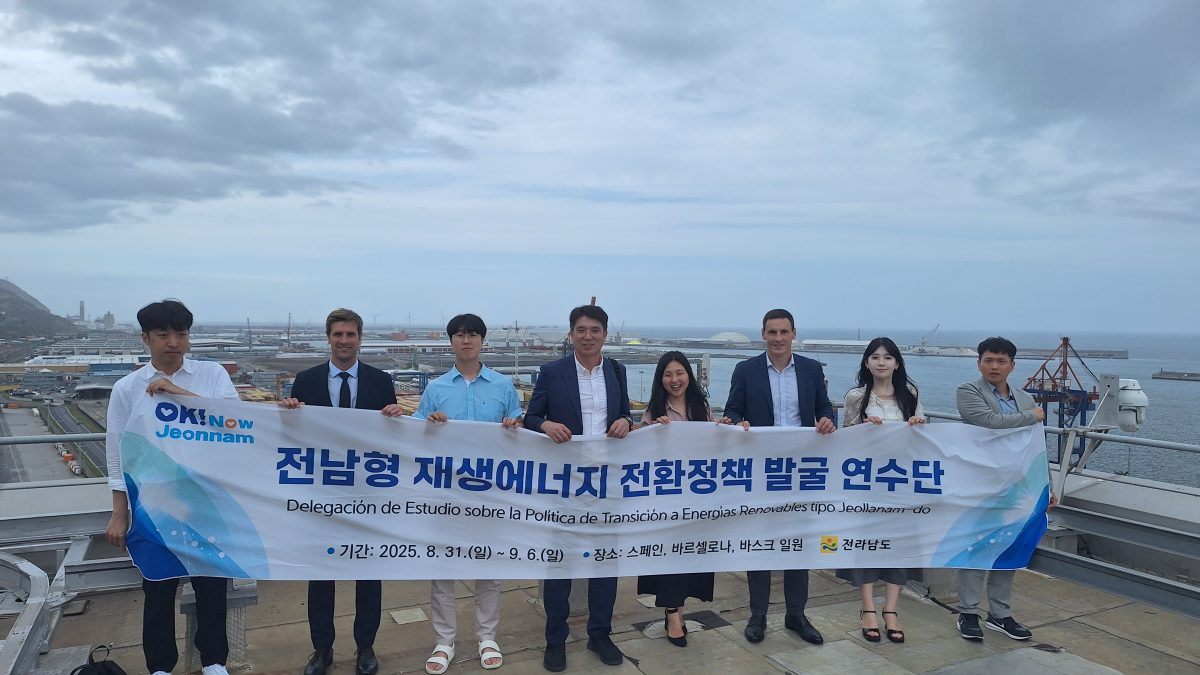A delegation from the Provincial Government of Jeollanam-do (South Korea) has visited the facilities of the Port of Bilbao to learn first-hand not only about the initiatives being taken in the Basque port to help and support its customers to manage the effects and challenges of the energy transition, but also about the different projects being taken forward in the port environment, particularly in the areas of energy transition, offshore wind power, hydrogen and synthetic fuels.
The senior officials making up the Korean delegation were accompanied on their visit by Andima Ormaetxe, Director of Operations, Commerce and Logistics of the Bilbao Port Authority, who explained in detail the actions being taken to help reduce the carbon footprint of the logistics chain operating in the port hinterland. One such initiative is the BilbOPS project to supply electricity, partly from renewable sources such as PV solar panels, to vessels during their stay in port, thereby helping to reduce greenhouse gas emissions and minimise noise and vibration levels when the system comes into operation in 2027. The project is co-funded by the Connecting Europe Facility (CEF Funds) and by the Bilbao Port Authority itself. Additionally, an 80 million euro loan has also been secured with the European Investment Bank (EIB), part of which will be used to finance the project.
In the course of the visit, the members of the Korean delegation were also provided with information about the development of green and digital maritime corridors, the agreements with the ports of Amsterdam and Duisburg to set up a renewable hydrogen corridor between the Basque Country and Central Europe, and the synthetic fuel and electrolytic hydrogen production plants that the company Petronor, part of the Repsol Group, is building in the port itself.
The members of the delegation from Jeollanam-do also showed an interest in learning about the role played by the Port of Bilbao as a wind power hub, thanks to the numerous wind power-related companies located in its hinterland, including producers and service providers for the entire value chain, with particular emphasis on wind turbine rotors and nacelles and associated electrical equipment. As an exporting port, Bilbao is home to several leading manufacturers of wind energy components, and is equipped with all the facilities required for the transport and logistics of this type of goods.
Companies such as Haizea Wind, which has recently expanded its concession area at Docks AZ-2 and AZ-3 with a view to continuing its phased growth and expansion plan, Euskalforging, Forjas de Iraeta, Laulagun, Navacel, Nordex Acciona, Sakana, Siemens Gamesa Renewable Energy (Sgre) and Vicinay Cadenas work in partnership with the Port of Bilbao for their internationalisation. As mentioned above, some of these companies have production plants in the port itself and benefit from the advantages implicit in having facilities on the quayside.
About Jeollanam-do
The visit to the Port of Bilbao by the delegation from the Provincial Government of Jeollanam-do is part of a trade mission coordinated by Basque Trade & Investment – Basque Internationalisation Agency of the SPRI Group, in which the Korean representatives, who are explicitly interested in building partnerships with Basque companies with experience in offshore, have met with different public and private players from the Basque energy sector to establish cooperative relationships. In addition to exploring opportunities for technological and industrial collaboration with the Basque Country, Jeollanam-do has a strategic interest in learning about the Basque model of energy transition and its public policies, in identifying key players in the offshore energy value chain and in analysing industrial infrastructure applicable within the geographical context of the province.
Strategically located in the south-west of the Korean peninsula, between China to the west and Japan to the south-east, Jeollanam-do is an excellent gateway for international trade to South Korea and its neighbouring countries. It is also the region of South Korea with the greatest potential for offshore wind power development (15 GW, 55% of the national total), favoured by the recent approval of a new law on offshore wind power that strengthens the role of the provincial government in this area. In 2024, traffic between South Korea and the Port of Bilbao totalled 252,557 tonnes, 5.7% of the total goods originating from and/or destined for Asia. In the first seven months of 2025, with 148,858 tonnes, South Korea’s share of traffic in relation to total trade with Asia grew to 6.7%.

 Port access
Port access